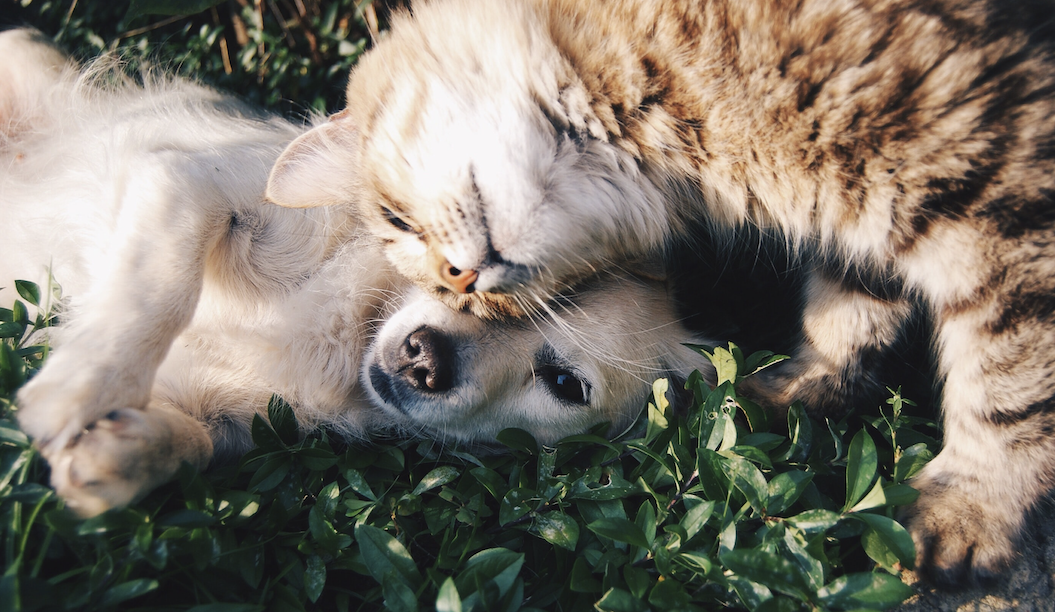A Q&A on Pets & Integrative Medicine

Our pets are our furry friends and even part of the family, and with that comes the mission to find the best treatment possible when they are suffering from disease, stress or other health issues. Similar to humans, animals can also be treated with integrative medicine, and more specifically, acupuncture and herbs. This month, Violet Song, Ph.D., LAc, of AOMA and Dr. Clay Bernard share how this holistic approach works to benefit pets.
Why is an integrative approach to care for pets as valuable as it is for humans?
SONG: From the Traditional Chinese Medicine point of view, the yin-yang theory, five elements and integration of mind and body, etc. can be applied to all life — including humans, animals and plants.
BERNARD: All living systems, whether it’s a human, dog, cat, fish or a tree, require balance for them to operate at an optimum level of health. Therefore, when you look at any animal from a more holistic perspective, you tend to see patterns of disease; the forest and not just the trees. Conventional medicine can be useful in many cases in order to “put out fires,” so to speak, but it’s easy to get lost in trees if that’s the only approach. It’s always best to integrate modalities that strengthen and work with the innate processes of healing when treating any species.
What got you interested in acupuncture and herbal treatment for pets?
SONG: I love animals and I have pets, or shall we say — fur family members!
BERNARD: After about five years of practicing conventional medicine, I started seeing and understanding the world and healing in a different way. I started to step back and rediscover how interconnected everything in the environment, including us, our pets, and our body systems are and how the body has this innate intelligence that is always striving for balance and health. I wanted to learn more about any modality that enhanced or strengthened this already-present healing process rather than just prescribe conventional medications all day, every day. That’s when I discovered TCVM (Traditional Chinese Veterinary Medicine) and the Chi Institute, and I poured myself into learning all I could.
Do animals reap the same benefits humans do when receiving an acupuncture treatment?
SONG: Very similar and you can find amazing documentaries of animals having acupuncture online.
BERNARD: Animals absolutely reap the same benefits, and maybe even more than humans since animals don’t seem to have to overcome the mind and any self-doubt about their condition or treatment modality. I’ve been practicing TCVM for almost eight years now, and the number of animals I’ve seen have had treatment success with acupuncture and herbs far outweigh those cases that didn’t seem to respond as much. From cancer patients and pets with epilepsy to chronic cases of gastrointestinal issues, allergies, and, of course, arthritic conditions, I’ve seen animals respond so well to TCVM.
What herbs are safe for humans but not for animals?
SONG: It depends on species. We use the herb called Cong Bai from green onions but it’s not safe for dogs.
BERNARD: I’m not sure of specific herbs to avoid, unfortunately. Most of my herbal training was spent studying the herbs in already widely used formulas that have been shown to be very safe and effective in animals. I know my mentor, Dr. Xie, has substituted herbs in many of his Jing Tang formulations for either safety or environmental sustainability reasons.
How do you calculate dose for animals vs. humans?
SONG: I usually use weight-based calculations as guidance. But considering species differences, NOAEL or MABLE methods can also be used. There are some great sources for pharmacology dosage calculations.
BERNARD: I’m not sure how humans are dosed, but for dogs and cats the general dosing of the herbal formulas is 0.5g per 10-20 lbs. Whether to use the lower or higher end of the dose depends on the impact the herbs have on the patient’s digestion.
What are the most common household herbs you can use for animals?
SONG: It’s hard to pick one or two. It’s really based on individual cases. For example, Yun Nan Bai Yao capsules are one of the most popular herbal products that vets prescribe here in Austin. This herb is used to stop bleeding and remove stagnation post-surgery. Of course, there are other popular herbal formulas too.
BERNARD: Some of the most common stand-alone herbs that I have pet parents use are Yunnan baiyao to stop or prevent potential bleeding, corydalis (yan hu suo) and/or dang gui (Chinese angelica) for arthritic pain, and bupleurum (chai hu) to support liver function.
What is the biggest challenge in treating animals?
SONG: Animals spit the tablets or pills out.
BERNARD: For me the biggest challenge when treating dogs and cats is not getting needle placement during an acupuncture session or learning the best way to administer herbs consistently, as one might expect, but it’s actually learning to carefully observe changes in the patient’s patterns over the course of treatment to understand when to shift gears in terms of different acupuncture points, herbs, or new foods to add or remove. Obviously, the pets can’t speak so being a keen observer is key to the best outcome.
When should you seek holistic care/TCM for animals vs. regular vet?
SONG: It’s always a good idea to always try and apply an integrative medicine approach for animals (and humans).
BERNARD: In general, TCVM treatment can be used in most situations as either stand-alone therapy, or in combination with conventional treatments. Since TCVM focuses on treating the individual patient rather than just the disease, it will always be useful as part of any long-term treatment plan. Emergency situations like trauma, uncontrollable seizures, or intestinal or urinary obstructions should be presented to your regular vet first in most cases. Also, diagnostic testing such as bloodwork, radiographs and ultrasound can be performed with your regular vet and can be useful in guiding treatment with your TCVM practitioner.
Where do you see holistic care for pets in the next 10 years?
SONG: This is definitely where the future is headed.
BERNARD: Holistic care is growing very rapidly as people are wanting the very best from all angles of therapy for their beloved pets and have grown weary of the conventional approach which uses lots of pharmaceuticals with lots of side effects. There has been a great shift in openness and acceptance to holistic medicine by even conventional medicine practitioners in just the last decade, and with most veterinary schools now offering integrative studies as part of the mainstream curriculum, I see the holistic approach growing in demand even more in the next 10 years.
 Violet Song, Ph.D., LAc is the only Ph.D. of TCM pharmacy in North America. She has a concentration in Tibetan herbal medicine and has participated in research studies that investigated the compatibility, pharmacology and toxicology of TCM formulas and Chinese ethnic medicine. She has also participated in studies funded by research grants from the National Science Foundation of China. Song has been on the faculty at AOMA since 2008.
Violet Song, Ph.D., LAc is the only Ph.D. of TCM pharmacy in North America. She has a concentration in Tibetan herbal medicine and has participated in research studies that investigated the compatibility, pharmacology and toxicology of TCM formulas and Chinese ethnic medicine. She has also participated in studies funded by research grants from the National Science Foundation of China. Song has been on the faculty at AOMA since 2008.
 Dr. Clay Bernard received his undergraduate and veterinary medical degrees from Louisiana State University and has been practicing small animal medicine since 2005. He began studying Traditional Chinese Veterinary Medicine (TCVM) under Dr. Shen Xie at the Chi Institute in Florida and is now certified in veterinary acupuncture while continuing to study Chinese herbology, food therapy, and Chinese Medical Manipulation (Tui-na). Dr. Bernard understands the powerful healing effects our animal friends have on our own lives, always reminding us to live in the present moment and to “wag our tail” in all weathers. It is that endearing quality that makes them, too, deserving of a comprehensive wellness plan.
Dr. Clay Bernard received his undergraduate and veterinary medical degrees from Louisiana State University and has been practicing small animal medicine since 2005. He began studying Traditional Chinese Veterinary Medicine (TCVM) under Dr. Shen Xie at the Chi Institute in Florida and is now certified in veterinary acupuncture while continuing to study Chinese herbology, food therapy, and Chinese Medical Manipulation (Tui-na). Dr. Bernard understands the powerful healing effects our animal friends have on our own lives, always reminding us to live in the present moment and to “wag our tail” in all weathers. It is that endearing quality that makes them, too, deserving of a comprehensive wellness plan.






